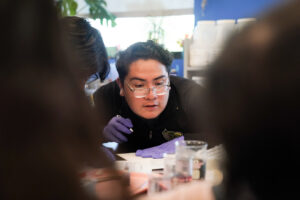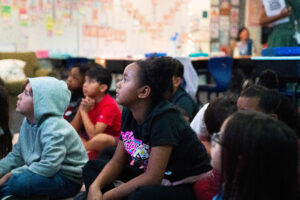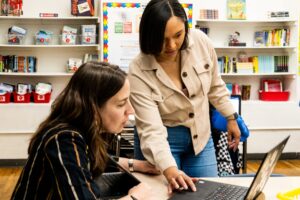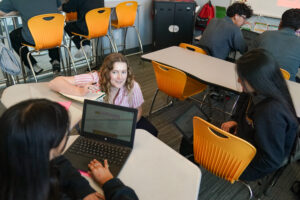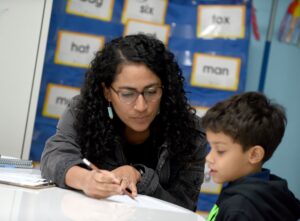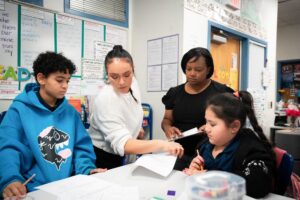Part III: Voices from the Field – Implementation Across Grades K-2 in Monson Public Schools
This is the third post in our three-blog series about Appleseeds: Evidence-Based Foundational Skills for Massachusetts, open-source instructional materials based on the Tennessee Foundational Skills Curriculum Supplement (TNFSCS). Click here to read Part I and Part II.
In this blog, TNTP Director Maggie Koelbl shares the conversation she had with a panel of teachers and school/district leaders from Monson, MA, where they are implementing the Appleseeds program with their full K-2 team in the 2022-23 school year.
Monson Public Schools:
- Kate Watts, Director of Curriculum and Instruction
- Joe Trivisonno, Principal
- Lauren Brin, Dean of Students
- Silvia Moroney, Kindergarten Teacher
- Paige Clark, First Grade Teacher
- Kate Royce, Second Grade Teacher
Maggie Koelbl, Director, TNTP: What has been most helpful or surprising about the Appleseeds implementation support and training so far?
Kate Royce, Second Grade: When we first got this, there was a sense of overwhelm – there’s so much, this changes everything about the way we teach – but with the support that TNTP gave and the ability to work in teams with consistency, that overwhelming feeling fell away very quickly. Now, we just get into it, and when something new comes up, we feel like, ‘we’ve got this, let’s rehearse it!’
Paige Clark, First Grade: It has been so helpful to have you here in person, in addition to having office hours and Zoom time – it just brings it all together for us. And being able to break out in our grade-level groups during trainings to rehearse lessons has helped us make a big shift. My kids are nailing Appleseeds lessons; they are just exploding! We get to see you a lot, and you come into our classroom, and we get all that direct feedback. It has been so valued by my [grade-level] team and received in such a positive manner.
Joe Trivisonno, Principal, Granite Valley Elementary School and Early Childhood Center: From an administrative lens, the professional learning that you offered us as a leadership team has been incredible. Speaking for myself, I’m so much more comfortable in the K-2 classrooms, using the ‘look-for’ tool and being able to give actionable feedback – that has been powerful. Your willingness to include the teachers in the site visit process, to pull back the curtain so-to-speak in a transparent process, has been awesome. People have been asking, can I be a part of the next visit? There’s an excitement amongst faculty with the way this has been rolled out.
Maggie: How has working with Appleseeds informed or changed your instructional practices?
Paige: This truly is the piece that was missing from our ability to teach phonics and phonemic awareness really well. It goes back to the systematic planning of the program. That’s the biggest win for me – I’m not piecemealing or copying things from here and there. I haven’t been on the Teachers Pay Teachers website all year! As an educator, it feels amazing to be teaching science-based curriculum with real results to all students, and they’re all getting the exact same standard and skill at the same time – and to watch and see the results as their brains respond to this instruction.
Joe: There’s a notable difference in the confidence of the staff. With the high-quality materials, they feel really empowered to fly. Even the way they’re talking about the instruction that’s happening in their classrooms – there’s a different level of confidence for sure.
Maggie: What results have you seen with the students since Monson started implementing Appleseeds?
Lauren Brin, Dean of Students, Early Childhood Center: The impact on student engagement is huge. They’re having fun, they want to play the games. They’re excited to be a part of it, and that’s a huge shift.
Silvia Moroney, Kindergarten: They’re reading. It’s very rare that we have readers in November of Kindergarten, and we’re seeing children of all levels reading or applying the skills. And we’re also seeing them using the skills from Appleseeds to help them with writing. We did a thankfulness writing exercise where they had to write six words – six things you are thankful for. Children were coming up with six words, writing them on their own, it was such a proud moment. I was so excited for the students to bring them home to their families for Thanksgiving, because they did it on their own. And legibly! You could read it! And that all comes back to Appleseeds. They were using those strategies, segmenting words. It brought it all together.
Maggie: What advice would you give another Massachusetts educator who is considering adopting Appleseeds in their school or district?
Lauren: Any initial discomfort you might feel is worth it, because you’re going to see the payoff really quickly. It’s totally worth it.
Silvia: Trust the process. Even though it is scripted, there’s still room for you to put your own teacher flair in it! To see the engagement of the students in how far they’ve come – I would highly recommend it to any K-2 teacher.
Kate Watts, Director of Curriculum and Instruction, Monson Public Schools: The support of the TNTP team has really set the groundwork for the program to be effective. It’s more of a wrap-around, fully immersive experience for professional development. We’ve had support with unpacking and familiarizing ourselves with the materials, administrative support that started in the summer, and ongoing support, both through regularly scheduled office hours and times when you’re in the building. You have been able to anticipate what our needs are and proactively prepare us for what we need to do next. That, combined with the grit and determination of our staff, is why we are where we are today.
Learn more about Appleseeds high-quality foundational skills materials. Click here to read Part I and Part II of our series.


